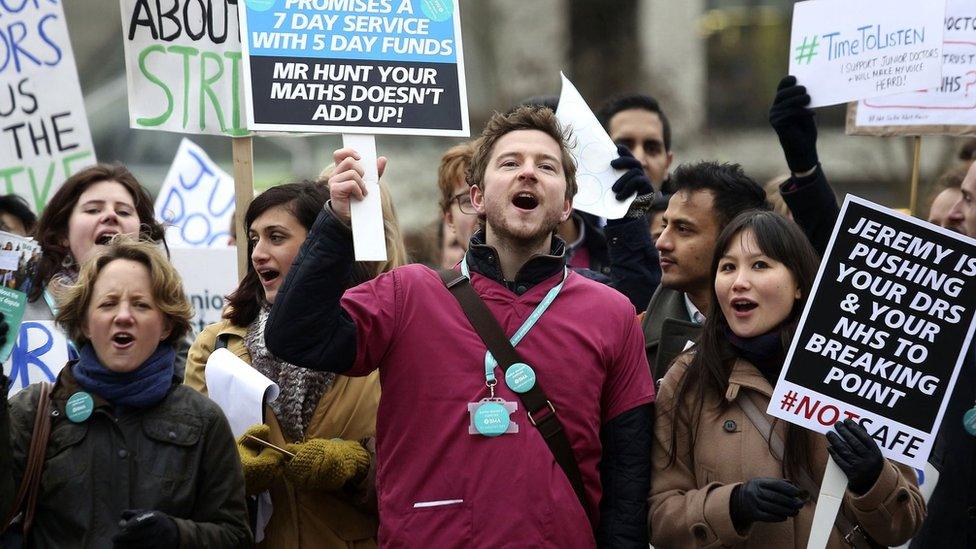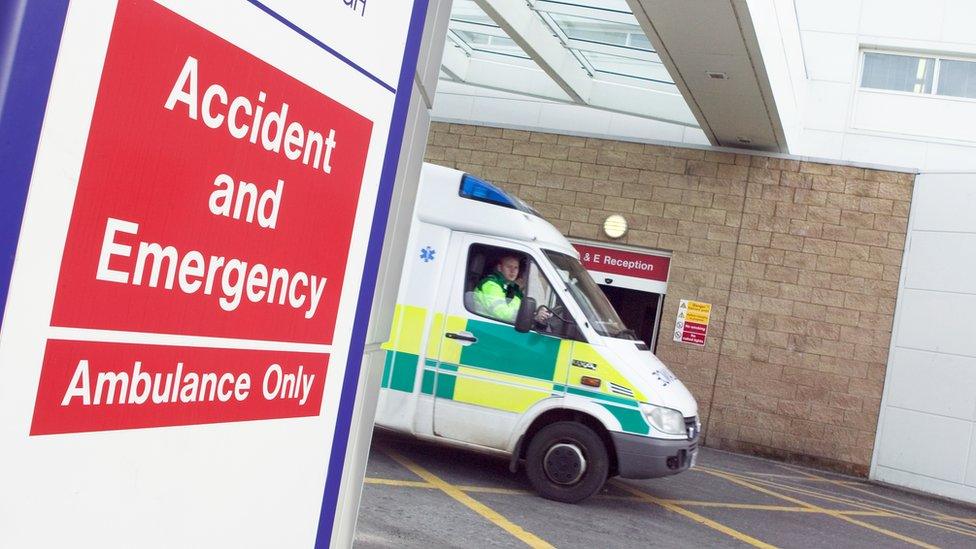Is the NHS underdoctored, underfunded and overstretched?
- Published

The answer to that question is yes according to a some senior medical voices.
It was posed at a special conference on the state of the NHS in England convened by the British Medical Association. The meeting highlighted again the financial stresses and recruitment pressures currently gripping the health service and the widespread debate about how to face up to these challenges.
Prof Jane Dacre, president of the Royal College of Physicians, coined the phrase in question. She argued there are not enough doctors and too many gaps in hospital rotas, with consultants often 'acting down' to cover shifts usually done by junior doctors.
Staffing woes
Prof Dacre noted that consultants are stretched enough with their own work without having to fill in other rotas. She said even she had been approached by an agency asking if she could work three 12-hour shifts as a senior house officer some distance from her home.
For the BMA it was the first 'special representative meeting' since 2011 when it summoned grassroots members at the height of the fraught debate over the Health & Social Care Act.
This meeting was convened to "discuss the current crisis in the National Health Service (and) address the problems with doctors' morale and workload".
The BMA's Council Chair Dr Mark Porter attacked the Government's claim to have "fully-funded" the NHS. He argued that the required £22 billion of annual efficiency savings by 2020 was a "fantasy" and the inevitable outcome would be cuts to services. The BMA, he argued, had looked hard at where the efficiencies might come from and had found nothing remotely matching the Government's target.
Dr Porter noted that the conference was not about the junior doctors' dispute but that this was a symptom of a wider crisis in the NHS in England. The Government, he claimed, had created a "bitter and intractable" row and had lost the hearts and minds of an important section of the medical workforce.
Austerity
The funding theme was picked up by Nigel Edwards of Nuffield Trust who argued that "the NHS has never experienced this level of austerity for this long a period". He based that view on the fact that the NHS in England by 2020 will have seen average annual funding increases of just 0.85%, well below the historic trend.
Nuffield Trust's chief executive went on to argue that there was a plan for the £22 billion of efficiency savings and that the NHS needed to be seen to try to achieve them. But, he acknowledged, this was a top down plan devised by NHS England and delivering it in full may prove an impossible task for some parts of the service.
The fact that spending on health in the UK is lower as a share of annual economic output than the European average was referred to more than once. Prof Dacre noted that there were up to 25% fewer doctors than in comparable health economies. She said it was time to "revisit" national investment in health compared to other countries.

Prof Sir Michael Marmot of University College London argued that spending on welfare improves health and reduces inequality.
So where does the Government stand in this debate? On the junior doctors' dispute, a Department of Health spokesperson said: "Had the BMA agreed to talk about Saturday pay as they promised, we'd have an agreement by now to tackle the clear independent evidence that standards of care are not uniform across the week."
As to the wider issue of NHS funding, ministers argue that creating a successful economy will of itself underpin a strong health service. Keeping a grip on overall public spending, they say, will help reduce interest payments on the national debt, and the NHS has seen real terms funding increases when most other Whitehall departments have experienced cuts. Ministers also fall back on the argument that they have given Simon Stevens at NHS England everything he asked for.
Some of the contributions at the BMA conference may have been politically motivated and many of the audience were not natural friends of the Government. But the fact it was called and the high level concerns expressed about funding suggest there is an issue which wont go away.
- Published25 April 2016

- Published24 April 2016

- Published23 April 2016
